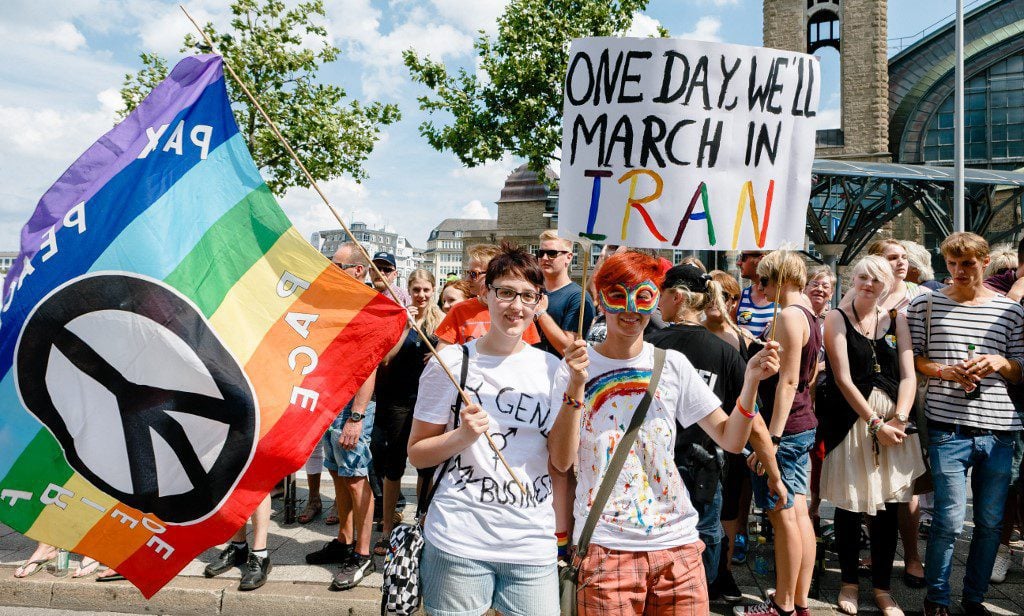
By: Florence Massena
Under sharia law in Iran, same-sex relations are illegal, with various punishments from imprisonment til death, while transsexuality was legalized in 1987 as a way to “cure” homosexuality. Nowadays, Iranian LGBTQ people live mostly hidden from society by fear of what might happen to them.
According to the report published following the forty-sixth session of the United Nations’ Human Rights Council in January, special rapporteur on the situation of human rights in the Islamic Republic of Iran Javaid Rehman expressed worry over how the LGBTQ community is treated, especially the children.
The report said that: “The Special Rapporteur is also concerned at reports that lesbian, gay, bisexual and transgender children were subjected to electric shocks and the administration of hormones and strong psychoactive medications […] These practices amount to torture and cruel, inhuman and degrading treatment, and violate the State’s obligations under the International Covenant on Civil and Political Rights and the Convention on the Rights of the Child.”
The report talked about how LGBTQ people go through social discrimination and also “reparative therapies” aiming at turning them “back” to heterosexuality. When caught by law enforcement and vigilantes, they can also face beatings, torture and sometimes rape, the report said, adding that they are insulted as “subhuman” and “diseased”.
The sharia law is at the base of the legal code since the 1979 Islamic revolution and tends to apply strictly principles issued from the religious principles of Islam, particularly the Quran the hadith. Under this law, homosexual intercourse between men can be punished by death, and men kissing can be flogged for lesser acts such as kissing, while women may be flogged for the same acts.
“As a result, the LGBTQ community in Iran stays largely underground”, Karen Kramer, director of publications for the Center for Human Rights in Iran, told Fanack. “LGBTQ people in Iran not only face severe legal and social discrimination, they also cannot seek legal remedies for injuries or rights violations because same-sex sexual relations are criminalized in the Islamic Republic. If LGBTQ individuals seek justice through the police or courts they risk prosecution themselves.”
The UN report highlighted a “fear of persecution” preventing people from issuing any official complaint. In 2019 during a press conference, foreign minister Javad Zarif answered a German journalist that: “Our society has moral principles. And we live according to these principles. These are moral principles concerning the behavior of people in general. And that means that the law is respected, and the law is obeyed.”
According to Kramer, it’s a clear sign that the current government “stands by these policies”.
In 1987, transsexuality was legalized, but only if sex-reassignment surgery was done beforehand. This surgery is legal and subsidized by the state. Iranian-born activist Shadi Amin told The Sun newspaper that it’s a way to “cure” a homosexual person: “The government believes that if you are a gay man your soul is that of a woman and you should change your body. We think this is a way to fight the existence of homosexual people because you change their body and you solve the problem. The regime gives gay people two choices – to be arrested as a homosexual and being punished even executed or change your body. […] They would rather carry out mass surgeries than executions because they know the world is watching them.”
As a result, they try to remain hidden in order to avoid any forceful treatment, abuse or even death. “Whereas previously this community was able to access at least some information, resources, support and community online, the government’s increasing online censorship and surveillance, and its prosecution of individuals for online content, has meant that even online resources and support have diminished for the LGBTQ+ community”, Kramer said.
According to her, repression against civil society organizations and activists have been so important that “the peaceful advocacy of LGBTQ+ rights has become even more difficult and dangerous”. A number of members of the community and activists end up fleeing abroad when they can, some building support networks from outside, hoping that their rights will evolve in their own country so that they can return to live without fear.
In the region, countries deal differently with the matter, some considering a strict interpretation of religion while others have developed a legal understanding of it. Homosexual acts can also be punished by death in Saudi Arabia, Yemen, Sudan and Afghanistan, while Iraq, Turkey, Jordan, Bahrain – only over 21 years old -, Lebanon and West Bank authorize them.


